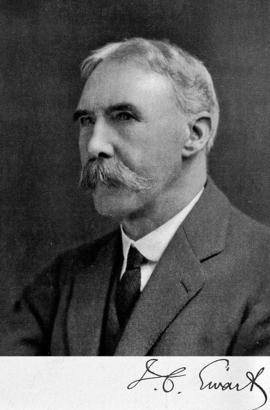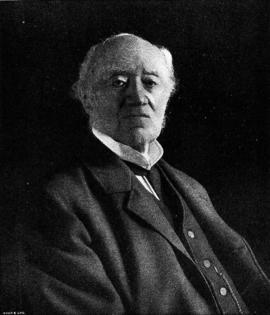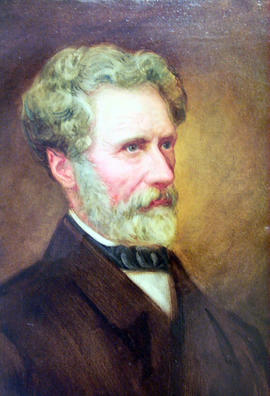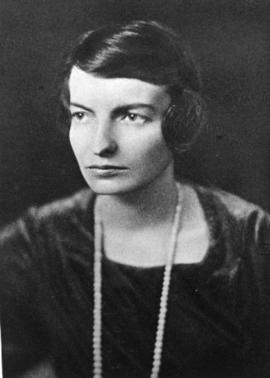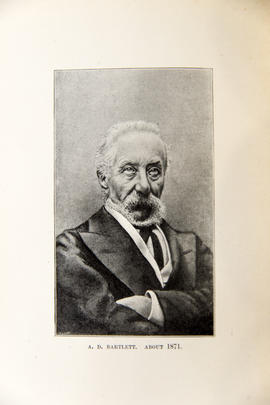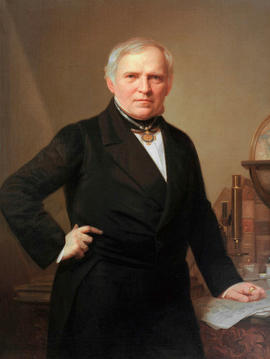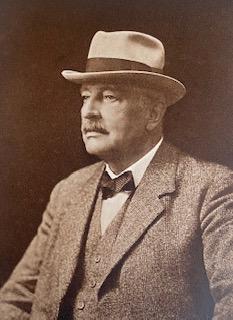James Cossar Ewart was a Scottish zoologist. He performed breeding experiments with horses and zebras which disproved earlier theories of heredity. He studied medicine from 1871 to 1874 at the University of Medicine. After graduation, he became an anatomy demonstrator under William Turner and then held the position of Curator of the Zoological Museum at University College, London, where he assisted Ray Lankester (later director of the Natural History Museum) by making zoological preparations for the museum and providing teaching support for Lankester's course in practical zoology. In 1878 he returned to Scotland to take a post of Regius Professor of Natural History at the University of Aberdeen from where he moved to the University of Edinburgh in 1882, staying in the post until 1927.
Wilhelm Lilljeborg was a Swedish zoologist. He is known for his work on the Cladocera of Sweden, and on the Balaenoptera. He was a member of the Royal Swedish Academy of Sciences from 1861
Sir Arthur Everett Shipley was an English zoologist and Vice-Chancellor of the University of Cambridge. He read natural sciences at Christ's College, Cambridge, specialising in zoology. Shipley specialised in the study of parasitic worms, publishing nearly fifty papers on them and leading to his election as a Fellow of the Royal Society in 1904. He stayed at Cambridge, being appointed university demonstrator in comparative anatomy in 1886, lecturer in the advanced morphology of the Invertebrata in 1894, and reader in zoology in 1908. He was elected a fellow of Christ's College in 1887 and became college tutor in natural sciences in 1892. In 1891 he was appointed secretary to Cambridge's Museums and Lecture Rooms Syndicate. In 1910 he was elected Master of Christ's College, a post he held until his death, and from 1917 to 1919 he was Vice-Chancellor of the University of Cambridge. In 1893, he published The Zoology of the Invertebrata, which became a university textbook
Carl Jakob Sundevall was a Swedish zoologist. Sundevall studied at Lund University, where he became a Ph.D. in 1823. After traveling to East Asia, he studied medicine, graduating as Doctor of Medicine in 1830. He was employed at the Swedish Museum of Natural History, Stockholm from 1833, and was professor and keeper of the vertebrate section from 1839 to 1871. He wrote Svenska Foglarna (1856–87) which described 238 species of birds observed in Sweden. He classified a number of birds collected in southern Africa by Johan August Wahlberg. In 1835, he developed a phylogeny for the birds based on the muscles of the hip and leg that contributed to later work by Thomas Huxley. He then went on to examine the arrangement of the deep plantar tendons in the bird's foot. This latter information is still used by avian taxonomists. Sundevall was also an entomologist and arachnologist, for which (for the latter field) in 1833 he published an early catalog Conspectus Arachnidum. Much later in 1862, he wrote a monograph proposing a universal phonetic alphabet, Om phonetiska bokstäver. Sundevall is commemorated in the scientific names of four species of reptiles: Elapsoidea sundevalli, Leptotyphlops sundewalli, Mochlus sundevallii, and Prosymna sundevalli.[1] Also the rodent, Sundevall's jird (Meriones crassus) is named after him.
Zoologist, Acting Superintendent of the Gardens and Secretary to the Garden Committee of the Zoological Society of London (appointed 1902)
Joan Beauchamp Procter was a British zoologist and herpetologist. She worked initially at the British Museum (Natural History) and later at the Zoological Society of London, as the first female Curator of Reptiles at London Zoo. She undertook substantial taxonomic work and made innovative contributions to veterinary practice and zoo displays. She wrote scientific and popular zoological articles, including early accounts of the behaviour of captive komodo dragons.
Abraham Dee Bartlett was the second son of John Bartlett and Jane Dunster. He was interested in animals as a child and his father's friend was Edward Cross, owner of the menagerie Exeter Exchange. He had a taxidermy business near the British Museum. Dead birds were sent to him for taxidermic preservation, and for his exhibits he received a gold medal at the Great Exhibition of 1851. He was among the first to reconstruct a specimen of the dodo, and this was displayed at Sydenham Crystal Palace, where he was appointed naturalist in 1852.
He associated himself with the Zoological Society of London and was offered the position of superintendent made vacant by the death of John Thompson at the garden in Regents Park in 1859. He was an agent for the acquisition of wild animals and was involved in their sale to circus agents. In 1882 he became unpopular after deciding to sell the African elephant Jumbo to P T Barnum. He became an authority on the care of wild animals and published papers in the Proceedings of the Zoological Society of London and other journals. He received a silver medal by the Society in 1872 and was made an associate of the Linnean Society in 1879.
Bartlett died in the zoo premises in 1897 after suffering from an illness. His son, Clarence, who had been assistant superintendent at the Zoo, took his position as superintendent. Another son, Edward, became a taxidermist and curator at the Maidstone Museum and the Raja Brooke's Museum. Several writings of Bartlett were published after his death in two books, 'Wild Animals in Captivity' (1898) and 'Life among Wild Beasts in the Zoo' (1900).
Christian Gottfried Ehrenberg was a German naturalist, zoologist, comparative anatomist, geologist and microscopist.
John Edward Gray was a British zoologist. He was the elder brother of zoologist George Robert Gray and son of the pharmacologist and botanist Samuel Frederick Gray. Gray was keeper of zoology at the British Museum from 1840 until 1874, before the natural history holdings were split off to the Natural History Museum. He published several catalogues of the museum collections that included discussions of animal groups and descriptions of new species
Frank Evers Beddard was born in Dudley, Worcestershire, the son of John Beddard. He was educated at Harrow and New College, Oxford.
Beddard was naturalist to the Challenger Expedition Commission from 1882-1884. In 1884 he was appointed prosector at the Zoological Society of London. He was also Vice-Secretary at the Society.
He became lecturer in biology at Guy's Hospital, examiner in zoology and comparative anatomy at the University of London, and lecturer in morphology at Oxford University.
Apart from his publications on wide-ranging topics in zoology such as isopoda, mammalia, ornithology, zoogeography and animal coloration, Beddard became noted as an authority on the annelids, publishing two books on the group and contributing articles on earthworms, leeches and the nematoda for the 1911 Encyclopaedia Britannica. Beddard contributed biographies of zoologists William Henry Flower and John Anderson for the Dictionary of National Biography. He was the author of volume 10 (mammalia) of the Cambridge Natural History. Beddard's olingo (Pocock, 1921) is named after him.
